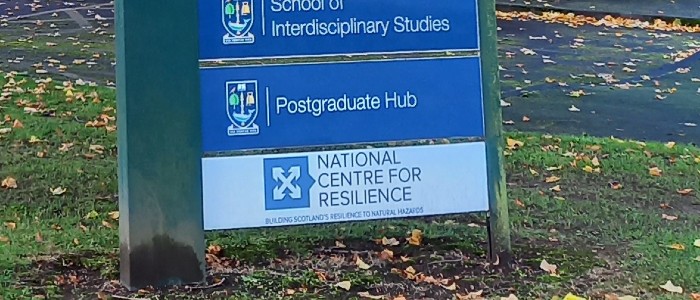Supporting the Sustainable Development Goals
Published: 21 June 2023
The National Centre for Resilience has been highlighted in an article by The University of Glasgow team looking at The United Nations Sustainable Development Goals. The article looked at how the SDGs are woven through the work of the School of Interdisciplinary Studies, where The National Centre for Resilience is based.
In the last in this series on the United Nations Sustainable Development Goals, we look at our Dumfries campus, and the ways in which the SDGs are woven through the work of the School of Interdisciplinary Studies, led by Professor Fabrice Renaud, to generate end-to-end impact underpinned by the SDG principles of partnership and interaction between Goals.

The School of Interdisciplinary Studies, based in Dumfries, recently launched a consultation to decide upon a new title for the School. The new name, which is in the final stages of consultation, is intended to reflect the strong environmental and social sustainability ethos of the School, and its long-standing alignment with the UN SDGs. The SDGs play a central role in the design of courses within the School. Three new courses in Environmental Science and Sustainability starting in 2023 introduce, explore and address SDGs through a range of themes. These courses are offered to all students on the Dumfries Campus, therefore students taking non-environmental degree programmes can engage in the key SDG themes and carry this knowledge into their own professions (SDG4, SDG6, SDG11, SDG13). New courses and programmes in subjects allow students to better engage with subjects related to the UN SDGs. This commitment is further strengthened through a developing portfolio which includes recently introduced postgraduate programmes in Environmental Risk Management and Sustainable Tourism & Global Challenges, and proposals of an undergraduate degree programme in Global Sustainable Development and new postgraduate offerings in Ecology & Environmental Monitoring, and Language & Literacy Education. Dr Steven Gillespie, Head of Subject (Environmental Science and Sustainability) said: “The interlinked nature of environmental problems is complex and often difficult to address, but solutions are possible if we have a robust understanding of these complexities and make positive changes. The environmental science and sustainability programmes within the School provide a portfolio of SDG-focused courses aiming to expose students to the challenge but also the solutions towards a more sustainable pathway for society. Three new courses addressing SDGs have recently been added to our portfolio including Water, Natural Hazards and Resilience (SDG3, SDG6, SDG9), Energy, Waste and Pollution: Options for Sustainability (SDG3, SDG6, SDG7, SGG12, SDG13) and Water Resources Policy and Governance (SDG9, SDG11, SDG12, SDG17).”
Our Dumfries campus is also home to the National Centre for Resilience. The Centre was created in response to the Civil Contingencies Act and delivers specifically against the ‘Communities’ theme of the Scottish Government’s National Performance Framework (NPF) by supporting people in communities to develop resilience to a range of social and natural hazards. The NPF is a framework for all of Scotland and measures our national wellbeing. The NPF uses the SDGs as a lens through which impact is measured, and as such, the SDGs are a major driving force behind the work of the Centre and the team regularly reports on their direct contributions. (SDG5, SDG6, SDG7, SDG9, SDG10, SDG11)

The themes of the SDGs are interwoven into programmes and courses taught on the Dumfries campus The School’s research encompasses a wide range of environmental and social topics including literacy attainment, inequalities in end-of-life contexts, maritime heritage, peatlands and many more. A recently finalized international project, funded by NERC and in collaboration with the School of Geographical and Earth Sciences and colleagues in the UK, China and Japan, focussed on understanding synergies and trade-offs between sustainable development goals at the sub-national scale. Among many deliverables, this work led to a journal special issue where all SDGs were addressed and with contributions from around the world. In another example, which has received funding from the British Council, Dr John Shi leads a research team including local partners from Istanbul Technical University and AFAD (Disaster and Emergency), aiming to develop a big data-based flood prediction system. As the world’s largest production region of hazelnuts and the only tea growing area in Turkey, the Eastern Black Sea Region has suffered from increasingly frequent and severe flood events over recent decades, which have been a prevalent concern for local stakeholders. This research would significantly improve flood early warning and agricultural resilience under climate change in the region that can be further adapted in other flood-prone regions globally. (SDG13, SDG15, SDG17)
Professor Fabrice Renaud, Head of School, commented: “The School addresses sustainability issues in its research and degree programmes not only in the social and environmental domains but also at their intersection. As we move forward and grow as a School, we will continue developing new programmes, research and scholarship activities linked to the sustainability theme. The alignment of research with sustainability in general terms, and particularly around the Sustainable Development Goals, supports a core ambition of our School to tackle real world issues that are relevant locally, regionally and internationally."
First published: 21 June 2023
<< News
Learn more about the UN Sustainable Development Goals

